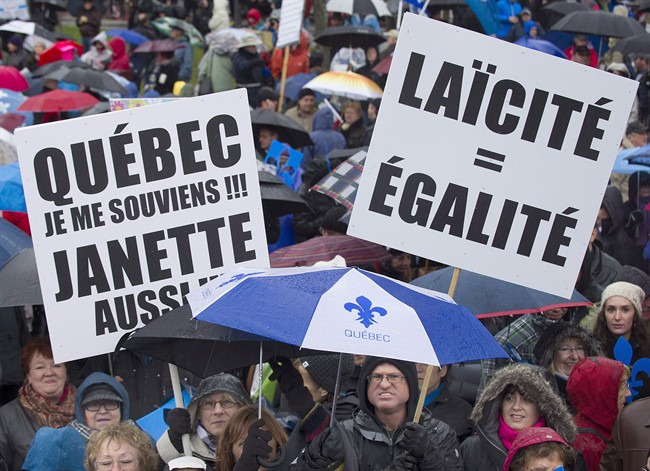As Quebec heads into an election year, you can be forgiven for thinking you have entered a time warp as the province once again sets itself up for a debate on religious neutrality and reasonable accommodation.

The last provincial election campaign in Quebec garnered national and international media attention for seeking to legislate away “ostentatious” religious symbols from the public service through the inaptly named Charter of Values. Of course, this was certainly not the first time that the province resorted to identity politics in order to shore up votes.
Last election, however, it seemed as though there were a growing number of unlikely voices that were condemning the tone of the Parti Québécois’ proposed Charter of Values. One notable voice was the late premier, Jacques Parizeau, most famously known for his “money and ethnic vote” comment the night of the 1995 referendum.
Parizeau joined the chorus of prominent separatists to claim the PQ’s proposal had gone too far. Writing in the Journal de Montréal, the former premier stated that this was the first time Quebec has sought out the legislature in order to do away with anything religious.
“Quebec has become a secular society, the separation of church and state was established, as well the neutrality of the state in regards to religion. All of this was done gradually.”
In other words, much like the experience of every other Western democracy, Quebec, too, does not need to turn to lawmakers in order to forcibly legislate a secular society.
So it seems rather odd that we find ourselves once again in a situation wherein a governing party is seeking to single out a minority religion through legislation that will in all likelihood be quashed by the courts.
First tabled in 2015 by the Liberal government, Bill 62 aims to stamp out the niqab from either end of the public service, prohibiting the offering or receiving of public services while wearing a niqab. Initially, the bill would have only applied to provincial public services but earlier this month, provincial Justice Minister Stéphanie Vallée proposed amendments that would have the bill apply to municipalities and public transit organizations.
This has put Montreal Mayor Denis Coderre squarely at odds with the provincial Liberals, with Coderre defiantly asserting that the province won’t dictate to the city of Montreal – the most diverse part of the province and the driver of the Quebec economy – how to deliver its services or to tell its employees how to dress.
According to data from Statistics Canada’s 2011 household survey, the number of Muslim women in Quebec is roughly 114,000. There are no reliable metrics on how many of these women wear religious head coverings, let alone face coverings. But even if we were to assume that half of these women all chose to wear the niqab, it would represent 0.007 per cent of the province’s population, which hardly seems like a pressing issue for the legislature.
As the Montreal Gazette’s Don Macpherson notes, “Bill 62 stigmatizes the tiny number of Muslim women in Quebec who wear facial veils. It encourages their persecution, like the harassment of women wearing Muslim head scarves during the debate on the former Parti Québécois government’s ill-fated ‘charter of values.’ It would enshrine in legislation the hypocrisy of Quebec’s ‘Catho-laïcité,’ or Catho-secularism. One of Vallée’s amendments pretends that Quebec’s public institutions are founded on the separation of church and state, while the bill would preserve the crucifix placed in the Assembly to symbolize an alliance between the two.”
Quebec politicians love to chime on about the importance of religious neutrality until it comes to the giant cross in the National Assembly. Then, all of sudden, the political class opts instead for a sort of selective secularism, claiming that the crucifix is part of the province’s patrimoine or cultural tradition. It doesn’t seem to occur that the crucifix was only introduced into the provincial legislature in 1936 by Maurice Duplessis, which hardly makes the cross an entrenched part of Quebec’s culture or tradition.
In the last election, the PQ made the mistake of assuming popular opinion of the Charter of Values would translate into people voting for a party that was at the helm of a province with multiple economic woes. This time, however, the Liberals are governing the province as its economy is doing objectively well, with record low unemployment and job growth.
The PQ made another mistake, which was to cast the religious neutrality net too wide, targeting Jews and Sikhs in the process. The Liberals thus far seem to be limiting the debate to the religion with the most negative perception in the province.
The unfortunate reality is that for the vast majority of my life, Quebec politicians have openly pandered to xenophobic sentiment, so I’m not holding my breath on the next election being any different.
Supriya Dwivedi is host of The Morning Show on Toronto’s Talk Radio AM640 and a columnist for Global News.








Comments